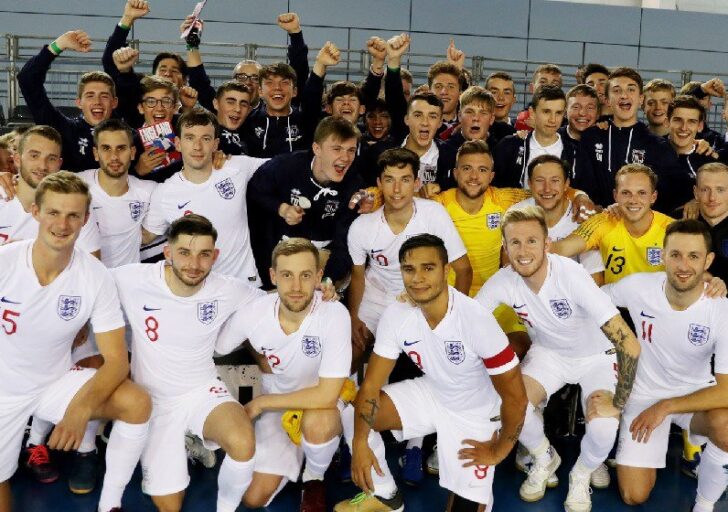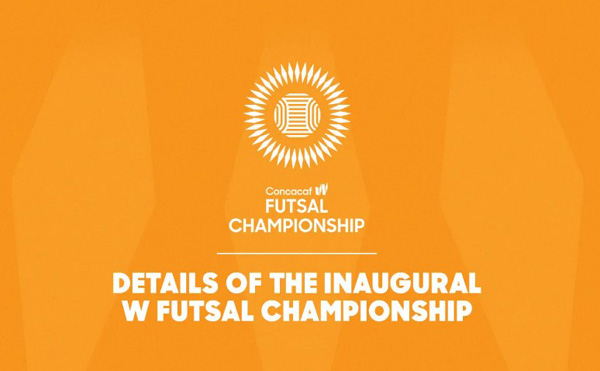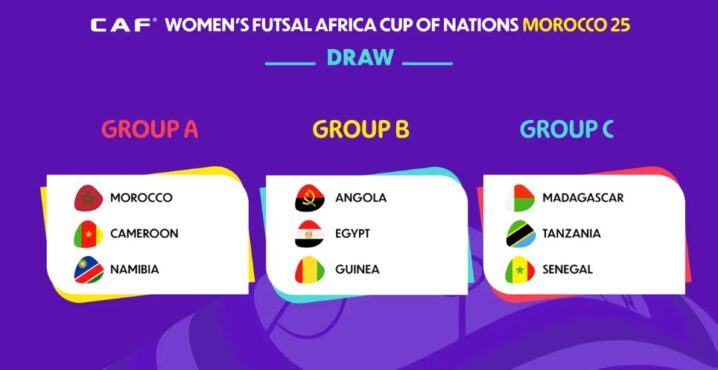Estimated reading time:18 minutes, 30 seconds
Uncertainty Surrounds England Futsal’s Ability to play in UEFA and FIFA tournaments
England Futsal (EF) recently celebrated a significant milestone as both their men’s and women’s teams were drawn into the qualifying stages for major international tournaments. The men’s team was drawn with Spain, Bosnia & Herzegovina, and Switzerland in the UEFA Futsal EURO 2026 qualifiers, while the women’s team’s group includes Finland, Slovenia, and Moldova in the inaugural UEFA European Qualifying Competition for the 2025 FIFA Futsal Women’s World Cup. This development could be a pivotal moment for futsal in England, showcasing the sport and helping to advance its domestic development.
(Main picture: England qualifying from the preliminary round into the main round qualifiers in second place to Latvia for the 2021 FIFA Futsal World Cup – Source of the picture: The FA website (2019)
Financial Realities: Challenges and Strategic Adjustments
On 30 May, EF stated: “England Futsal are delighted by the draws made today for the UEFA Futsal EURO 2026 Competition and the UEFA European Qualifying Competition for the 2025 FIFA Futsal Women’s World Cup.”
The independent body acknowledged the draws and emphasized the organizational impact and the need to reassess their strategies and financial challenges. They highlighted the necessity to reassess their operating budgets and realign their fundraising targets in light of these developments. “Today’s draws allow us as an organization to recalibrate with greater accuracy the operating budgets for any prospective England national teams, realign our fundraising targets, and assess our current performance against these,” the statement continued.
The strategic language used by EF indicates a methodical approach to overcoming these financial hurdles. While there is hope and excitement about England’s potential participation on the international stage, there is also cause for concern about the apparent lack of fundraising success since they first confirmed in February that the English FA would not be providing any funding or support for either the men’s or the women’s campaign (See National Team FAQs on the England Futsal landing page).
A Tale of Two Voices: Official Statement vs. Personal Perspective
Shortly after the official post by EF, interestingly, a post by their Chairman, Stephen Mitchell, chose to take a different angle with the language he used, posting via LinkedIn:
“On Thursday this week, it was my honour and privilege to represent the Futsal community in England and England Futsal Ltd in Nyon at UEFA headquarters. I was there for the live draws for the forthcoming competitions which we’ve been fortunate enough to secure the rights to deliver and enter on behalf of the FA.
The men’s team will face Spain, Bosnia & Herzegovina, and Switzerland in home and away fixtures between December 24 & April 25. Super excited for the three home games and especially welcoming Spanish delegation.
The Futsal Lionesses will travel to Moldova alongside Finland, and Slovenia in the group stage of the Euro qualifying tournament for the inaugural FIFA Woman’s Futsal World Cup 2024/25.
We now know the road ahead and can plan accordingly. If you’re interested in being part of the journey as a sponsor, fundraiser, innovator, host or partner then please do not hesitate to get in touch to play your part in these historic moments for the football community.”
The official post from EF uses a formal and professional tone, focusing on the organizational impact, financial challenges, and the need for strategic reassessment. It reflects a cautious optimism, emphasizing the necessity to recalibrate operating budgets and realign fundraising targets in light of the new developments.
In contrast, Stephen Mitchell’s post is more personal and enthusiastic, reflecting excitement and pride in representing the futsal community. His tone is informal and optimistic, encouraging community involvement and support through sponsorships, fundraising, and partnerships. He shares specific details about the matches and invites those who may be interested and the futsal community he is linked with to be part of the journey, creating a sense of collective effort and opportunity.
Recent Developments: Transparency on Financial Struggles
After sending a draft of this article to England Futsal for comment earlier in the week, we did not receive a direct reply. However, we noticed a shift in the narrative on Stephen Mitchell’s LinkedIn page. In a post query, he discussed the logistical and financial challenges of organizing international trips for the teams:
“Over the next 12 months, as a small under-funded NGB of sport, England Futsal will (hopefully) be sending senior England teams to Moldova (W), Spain (M), Switzerland (M) and Bosnia & Herzegovina (M). We don’t (seemingly) have access to FA partners. There will be c.20-25 people in each travelling party including players, support staff, observers, and delegates. Our initial thinking would be to use general web booking platforms to source flights. Is there a better option? Does a travel partner for small federations like us exist? How do others organise/ source/ book, and who/ where do we source trusted partners in this space? It feels like all being well, we’ll be spending c.20k as an overall amount. Any ideas LinkedIn?”
This post highlights the financial constraints and logistical difficulties faced by EF and suggests a lack of support from the FA – “We don’t (seemingly) have access to FA partners” – It portrays a more transparent and urgent plea for assistance, contrasting with earlier optimistic tones. But, it is somewhat surprising that England Futsal is still unsure how to organize these tournament trips, given their successful coordination of the U19 men’s team’s participation in UEFA Euro qualifying tournaments in Lithuania and Italy earlier in 2023. And on the England Futsal podcast interview, Mitchell said the u19 trips to Lithuania and Italy cost £23k and £35k respectively.
Confusion in the Community: Impact of Mixed Messaging
The different tones and focuses of the early posts would have confused anyone who had the opportunity to read them in the futsal community along with potential stakeholders, sponsors, and partners about the organization’s priorities and the seriousness of the financial challenges. Mitchell’s initial LinkedIn post created overly optimistic expectations without adequately addressing the financial realities. In contrast, the new post, like the official post, prepares the community for potential financial setbacks, and the likelihood that England may not fulfil its international commitments. His recent LinkedIn post further highlights the organization’s urgent need for logistical support, financial backing, and expertise, which differs from the earlier enthusiastic tone that conveyed a sense of confidence and know-how.
It should also be noted that on February 8th, England Futsal referenced a ‘minimum viable operating budget of £150,000’ and identified April 2024 as the ‘first major milestone which will dictate the viability of the Lionesses roaring in October 2024.’ That milestone date passed, and the community was left waiting for an update until Friday.
On Friday, EF announced, to much praise from their followers, that the Lionesses will be competing in the women’s first-ever FIFA Futsal World Cup European qualifiers. Yet, just 24 hours before this announcement, Mitchell stated in his post, “It feels like, all being well, we’ll be spending around £20,000 overall”— emphasizing the uncertainty of the team’s travel plans. Suddenly, 24 hours later, EF confirmed the women’s team’s participation. While it’s wonderful that the women’s team will compete and represent their country, where did the money suddenly come from? If they had the funds, why imply otherwise? If reserves were used to back the women’s team, what does this mean for the men’s team? The women’s team will travel to Moldova for a mini-tournament, where all fixtures occur in one location. In contrast, the men’s team must host and travel for home and away fixtures, requiring significantly more funding.
Regarding the finances needed, the official competition rules for the men’s and women’s are available on the UEFA website and are straightforward to understand. The standard financial provisions are consistent across the board. For a mini-tournament, the host country, with support from UEFA, will cover the costs of hotel accommodations, food, and local transportation for up to 21 people (14 players and 7 support staff) for the visiting teams. This is fewer than the 20-25 people that EF wants to bring. Additionally, UEFA will contribute €10,000 towards travel expenses. Therefore, the women’s squad will only need to fund the remaining outbound and return travel costs, which I estimate to be between €20,000 and €25,000 gross, or €10,000 to €15,000 after the UEFA subsidy.
England’s men’s team programme has not been active since 2020 so UEFA’s coefficient for the nation is surprising, which meant they went straight into the main round stage. Had they entered in the preliminary round, they could have enjoyed the same benefits as Scotland and Northern Ireland, which follows a mini-tournament format. However, by UEFA advancing them directly to the main round, they now have to fund three home matches and three away matches. UEFA only contributes £5,000 towards travel for each away match. The total estimated cost is around £90,000, with approximately £30,000 for home games and £60,000 for away games. Entering the preliminary round would have been much cheaper. Additionally, England might have won some games against weaker opposition, using that success to attract sponsors for future rounds.
These questions are important in understanding the strategic decisions of EF and the financial implications for the men’s team. Furthermore, the sudden confirmation of the women’s team’s participation, despite previous financial uncertainty, prompts additional queries: Where did the funds suddenly come from? If reserves were used to back the women’s team, what does this mean for the financial stability of England Futsal and the future funding of both teams? These inquiries are crucial for transparency and trust within the futsal community and among potential sponsors.
The mixed messaging and apparent financial struggles highlighted by EF’s Chairman, in his recent LinkedIn post, raise concerns about the adequacy of the current funding model and the support provided by the English FA. Such inconsistencies could potentially undermine confidence in England Futsal’s ability to manage international commitments and develop sustainable pathways for both the men’s and women’s teams. Clarification on these issues is essential for stakeholders and partners alike as they consider their involvement with England Futsal in the future.
Historical Context: From Suspension to Significant Financial Figures
The journey to this point has not been without its setbacks. In September 2020, the entire England National Futsal team programme was suspended by the Football Association (FA). And the men’s team was withdrawn from the EURO 2022 play-off games, resulting in fines from UEFA. These decisions were made as part of their response to the financial impact of the COVID-19 pandemic, which significantly reduced funding and resources allocated to futsal programmes in England. Our sources tell us that the futsal yearly budget was as little as £1 million (unconfirmed). However, the FA announced via their website (https://www.thefa.com/news/2022/apr/29/financial-results-2020-21-20220429) significant financial figures for that year: “The FA generated a total turnover of £443m [2019-20: £335m] with an operating profit of £132m [2019-20: £9.8m]. These financial results comprise a consolidation of Football Association Limited, Wembley National Stadium Limited, and the National Football Centre Limited.” This discrepancy raises questions about the allocation of resources and the FA’s commitment to supporting futsal, given its overall financial health.
Structural Shifts: FA’s Influence and Futsal’s Future
Moreover, there has been a notable shift in the organizational structure of English futsal. England Futsal, an independent body, was established by a group outside of the FA, who claim to have a deep understanding of the organization and existing relationships. However, no tender process was conducted, they were made the FA’s delivery partner and given responsibility for the national team pathways. This decision was made without allowing other groups the opportunity to demonstrate their suitability as well to take the national team programme forward. England Futsal Limited is a private company wholly owned by Michael Skubala, the former England Futsal manager, who has since continued his career in football as Lincoln City manager and maintains a lower profile now in futsal.
Recently, the FA also dissolved the FA Futsal Committee and incorporated its responsibilities into the Football Development Committee. This restructuring raises uncertainties about the future direction of futsal in England. The integration of futsal into a broader football development framework may impact the autonomy and focus needed for the sport’s development. However, the National Game Board shall be entitled to appoint two futsal representatives to the main FA Council. It will be intriguing to see who they will pick or if they will take the time to consult the futsal clubs/ community to see who they would like to represent them when questions still linger regarding the effectiveness of the previous FA Futsal Committee.
Depending on who you speak to, some argue that the FA Futsal Committee did their best with limited support. Others believe they were ineffective and often hindered developments, particularly those outside its direct control, by exercising influence and power beyond its remit and responsibilities. Critics contend that this committee acted autonomously due to a lack of interest and oversight from the FA, which allowed them to operate without consequence and, at times, abuse their power.
Home Soil Advantage: Challenges of Hosting and Funding International Fixtures
For the men’s team, the EURO qualifiers format entails fixtures being played both home and away between December and April. Group winners will advance directly, while the eight best runners-up will compete in playoffs in September 2025. As England prepares to host these competition fixtures, should EF raise the necessary finances, will the FA provide the necessary marketing and promotional support, or will this responsibility fall entirely on the independent body managing EF? Additionally, will EF be able to cover all costs required to meet the national team’s demands and host the men’s competition fixtures?
The last time England’s men’s team hosted a fixture at a venue outside of St. George’s Park was in February 2015 at the London Copperbox Arena when they welcomed Sweden for international friendly matches, attracting a crowd of 1,430. This event, we are told, (unconfirmed) was not supported by the FA’s media and marketing team. These upcoming fixtures will be their first competitive games on home soil in nine years. The question arises: can England Futsal attract a similar or larger audience 9 years later? It is also worth considering how many of those seats were sold versus how many tickets were potentially given away for free back then. Can the fixtures generate enough sponsorship? Will TNT Sports, the current National Futsal Series broadcast partner, potentially financially support the fixture and pay to broadcast it? Their 3-year contract is up this year, so these international fixtures could be an incentive to keep them on board. If these home fixtures are to be a success, the futsal community’s support will be essential as EF navigates the path ahead, striving to see their teams proudly represent the nation on the global stage.
The post by England Futsal and their chairman’s recent post on LinkedIn aims to communicate and gain an understanding of the financial challenges ahead that must be addressed, preparing the futsal community for further disappointments if they are unable to secure the funds needed to fulfil the commitments required for the competition. Will the England men’s national futsal team walk out onto the court? Unfortunately, this question remains unanswered, with many uncertainties.
Looking Ahead: Uncertainties and Challenges
There is also a broader issue regarding how EF will attract investment when the FA retains the right to reclaim responsibility for futsal. A comparison with Uganda is illustrative: their futsal association was set up independently of the FA, and due to their success, they later secured membership in the Federation of Uganda Football Associations (FUFA) and now receive support, recently benefiting from a sponsorship agreement between FUFA and betPawa. In contrast, EF was established to operate independently of the FA and receives no financial support or access to partners as Mitchell referred to in his post. The focus on fundraising in addition to sponsorship highlights the difficulties England Futsal has faced in securing financial stability.
While England Futsal knows how much money they need, the uncertainty lies in whether they can raise it or if the FA will support them. The upcoming competitions need to be a significant boost for English futsal. However, there are legitimate concerns within the community that there could be another disappointment around the corner if these financial and organizational challenges are not adequately addressed.
The current financial and operational uncertainty coming from England Futsal is all in sharp contrast to the confidence and optimism expressed when it was launched in December 2022. At that time, Graeme Dell, chair of the FA Futsal Committee said “The FA Futsal Committee welcomes the establishment of England Futsal as the official delivery partner for the format. This new partnership places the future of Futsal in England on a firm footing that provides stability and will ultimately benefit players and participants up and down the country, with solid structures in place to ensure many more people can enjoy the game in years to come.” It is hard to see that original confidence being justified given recent public statements.
We also sent this article to the FA to hear their thoughts, and this was their response:
FA Spokesperson: “In December 2022, we announced the launch of a new partnership with England Futsal, an independent venture with the aim of providing long-term stability and growth for Futsal in England.
“Since then, The FA has provided support for England Futsal to run Futsal CPD for coaches and referees as well as running a mentoring programme. The FA has also funded a National Youth Futsal Cup competition which will be taking place again during the 23/24 season.
“The launch of England Futsal has also seen the U19s men’s team compete in the UEFA EUROs 2022, and FA approval and endorsement for them to enter the senior England Futsal Teams in upcoming UEFA and FIFA competitions, based on the programme being funded and delivered by England Futsal.
“We look forward to continuing to work with England Futsal to support this format of the game.”
The FA’s statement emphasizes their partnership with England Futsal since December 2022, highlighting their commitment to futsal’s stability and growth. They mention support initiatives like CPD for coaches and referees, a mentoring programme, and funding for the National Youth Futsal Cup competition. The statement also notes achievements such as the U19 men’s team competing in UEFA EUROs 2022 and the approval for senior teams to enter upcoming UEFA and FIFA competitions.
However, the response does not directly address the concerns raised in the article regarding England Futsal’s financial challenges, the apparent lack of support for recent competitions, and the impact of structural changes on futsal development. By focusing on past achievements and current support rather than engaging with these specific concerns, the statement does not fully alleviate the uncertainties highlighted in the article.
Moreover, it is clear, from their statement, that The FA will not be funding the men’s national futsal team if England Futsal fails to secure the necessary finances, as stated: “FA approval and endorsement for them to enter the senior England Futsal Teams in upcoming UEFA and FIFA competitions, based on the programme being funded and delivered by England Futsal.” This is not surprising; we did state that EF had said earlier in the year via their website that the FA would not be financially supporting either national team. We only asked for the sake of debate if EF failed to raise the funds, could the FA potentially change its position? From their statement for this article, we now know they won’t. But why not give EF access to their partners, as Mitchell mentioned? If, as the FA said in their response, “We look forward to continuing to work with England Futsal to support this format of the game,” wouldn’t giving EF access to their partners/sponsors be the minimal amount of support for the format? And, it would have been up to EF to convince them to support the national futsal team programme? Why does the FA do this to itself, because the development of futsal will continue to grow across Europe and around the world, like what occurred with women’s football. The FA will be forced to invest in the sport and will end up playing catch up all over again when they could have been fully supporting the format’s development decades prior and been seen as a leader in the sport.
To avoid any misunderstandings regarding the intent of this article, we are delighted that the women’s team will make history, and we hope the men’s team gets to compete as well. This analysis summarizes the key points regarding England Futsal’s current situation, focusing on financial challenges, strategic uncertainties, mixed communications, and concerns about sustainability.
The views expressed in this article are not necessarily the opinion of Futsal Focus or the writer. This article is intended to provide a balanced view of the current situation facing England Futsal, highlighting both opportunities and challenges. The analysis presented is based on conversations with sources, and available information online, and aims to offer insights into the complexities of the sport’s landscape. Our goal is to inform and encourage discussion around the future of futsal in England.
Organ Donation
Futsal Focus is a supporter of Dáithí Mac Gabhann and his family’s campaign to raise awareness of Organ Donation. We encourage our readers to learn more about Organ Donation: https://www.organdonation.nhs.uk/
Futsal Focus
You can read more articles about International Futsal by going to the top navigation bar or by clicking here
If you like this article and would like to keep updated on Futsal news, developments, etc. You can now follow Futsal Focus via Google News. By following our page which will send you an alert as soon as we publish an article. Please click here and follow us on Google.
You can also keep updated on Futsal news, developments by submitting your email below in the Subscribe to Futsal Focus option.
Follow Futsal Focus by clicking on Facebook, Twitter, or Instagram or on the social media buttons on the website.








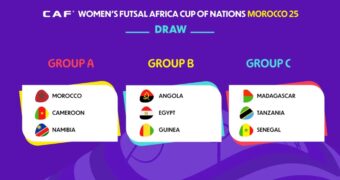
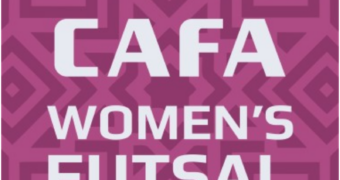




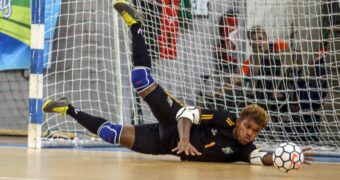
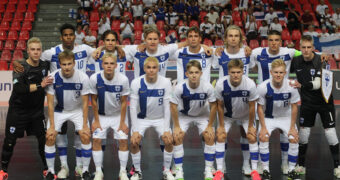
![Validate my RSS feed [Valid RSS]](https://www.futsalfocus.net/wp-content/uploads/2020/01/valid-rss-rogers.png)

